Oregon’s Jewish pioneers may have come to the far reaches of the frontier, but they, too, remembered their traditions. Almost as soon as enough Jewish men came to a town to constitute a minyan, they began organizing, at least for major services.
Although the earliest Jewish settlers in Oregon, according to most accounts, were Jacob Goldsmith and Lewis May, who came to Portland in 1849, the first Jewish New Year’s services in the Oregon Territory were held in the gold-rush boomtown of Jacksonville in 1856.
Jewish merchants, most recent immigrants from Germany via the California gold fields, made their way to southern Oregon when gold was discovered near Jacksonville in 1851 – making it for a time the territory’s “most populated and most important commercial trading center.”
The Jacksonville Gold Rush yielded more than $20 million worth of gold over the next 20 years, according to historian Robert Levinson, and for a time a small community of Jews made important contributions to the city.
Those first Jewish services, however, were a humble but heartfelt affair, with a small group of men gathering on the second floor of the McCully Building, the first brick building built in Jacksonville and the Oregon Territory and later known as the Odd Fellows Hall.
Elias Jacobs, a tailor and general store owner who came to Jacksonville in 1872, often led the services in later years, but there are no surviving newspapers providing details of the 1856 services.
For a generation or so, according to Levinson’s 1962 master’s thesis, “The Jews of Jacksonville, Oregon,” the small Jewish community thrived, until the gold ran out and other events created an economic downturn.
The last High Holidays services there were in 1883, and many of the pioneers and their children either had moved on or soon would, with most going to San Francisco.
Three of the pioneers lived out their lives in Jacksonville, the last dying in 1902. Stella Levy, the last direct descendant of a Jewish pioneer family, died at the age of 75 in 1936 and is buried in the Jewish section of the Jacksonville Pioneer Cemetery.
Levinson was able to document the business and civic involvement of Jacksonville’s Jews, but regretted that he wasn’t able to uncover more information about the personal lives of the pioneers.
Still, he said, “One of the Jewish faith traveling the Old Stage Road from Gold Hill to Jacksonville cannot help but feel that he has some personal history in this community, if only to claim that here, in the midst of the largest gold rush in southern Oregon, his co-religionists stopped in the 1850s to praise their God and conduct the first Jewish religious services in the Oregon Territory.”





